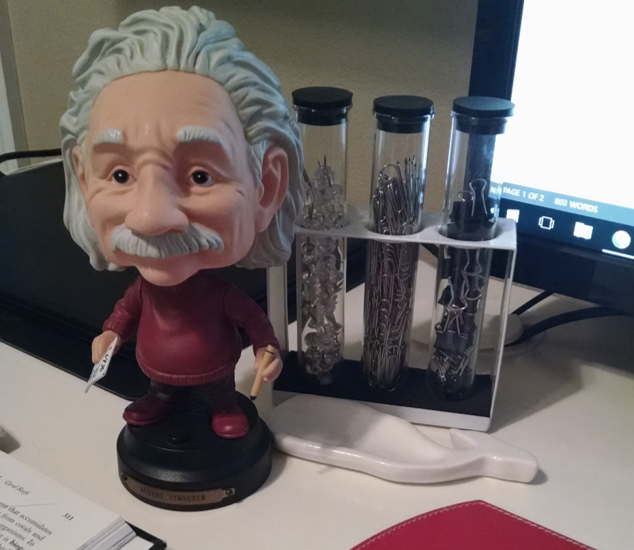
Let’s face it. You aren’t guaranteed that all your children will be just like you. In fact, it is pretty likely that you’ll have at least one that is VERY different. After talking with parents from around the country, I have noticed a common pattern. You see, I am a science geek. I love all things science. I even love many forms of science fiction (that will be another post). So I am often requested (volunteered) to teach and tutor science subjects. And, of course, I love that!
But many parents come up to me asking how to connect with their science-directed children. The conversation usually begins like this:

My desk-top friend!
“I know you love science, but frankly my husband and I have never really enjoyed it. I hated it in school. We love literature, writing, and history, but this child of ours struggles with those subjects. He is very strong in science and math, but we just don’t know what to do with him? How do we give him what he needs? How do we even talk to him?”
Believe me, I get it.
You see, though my husband and I love learning about, talking about, and teaching science (we met as physics lab partners in college!), we have “one of those” children, too. Our child was born a creative, artistic musician. He began playing piano on his own at age 3 and hasn’t stopped: classically trained in piano, adept at several instruments, college educated in music theory (he got a 5 on his AP Music Theory exam!) and jazz bass, and now professionally playing “gigs.”
He speaks music.
Well, I don’t. I certainly appreciate music and the creative realm it involves, but I can tell you that as he was growing up, his personality was polar opposite of mine. His learning style was completely different. The subjects he loved baffled me (No, I DON’T know what that poet really meant when he wrote that poem…he is dead now, so we will never know!).
I truly understand when you say you have a child who is very different from you.
Well, coming from the science/math-lover world, here are a few suggestions to help you better connect with your budding STEM-ist.

I had to take a vacation trip to the Arctic Circle!
- Show interest in THEM. Your child needs to know that you consider what he loves to be important. If it is important to him, then it is important to you, because you love him. That doesn’t mean you have to LOVE it, but you love HIM enough to enter his world. Ask questions. Dialogue with her. If you have a child who loves space and rockets, then look for cool videos you can watch together. Troll the NASA website for interesting topics. Look up her favorite subject matter on Creation websites such as Institute for Creation Research, Creation Ministries International, or Answers in Genesis. Or check out some of the science subjects I have blogged about!
- Find others who can pour into them. If you don’t feel comfortable teaching science or math, look for other avenues. Local co-op classes often offer science and math courses. There are many, many options for online or DVD courses. Look at your local museum or science center to see if there are any enrichment classes available (be aware that these likely will be taught with a secular world view, so make sure your student is prepared to engage in that environment).
- Incorporate science and math into their other subjects. This is especially helpful with elementary and middle-school aged students. If you have a reluctant writer, have him write a prequel to his favorite sci-fi movie. Let him illustrate it, too, for an added art element. If you have a computer geek, ask her to create a graphic to highlight major points of a historical era you are studying. I am sure she would have fun making a cool one on the Civil War or the Colonization Era.
- Realize that they are MADE this way. Yes, students need to be well-rounded and have educational instruction in all areas, but LET THEM EXCEL in the areas they love. Don’t hold them back. God has perfectly created them like this and I believe He will use their uniqueness in a mighty way!
So when you step back and scratch your head as you look at what your child is doing, wondering if she will ever learn those vocabulary words or if he will ever finish reading Tom Sawyer, just know that each one of your children has unique gifts and abilities. Homeschooling them gives you the perfect arena to build those skills while rounding out the other ones, too. You can tailor their educational experience to make this journey truly one that is out of this world!

